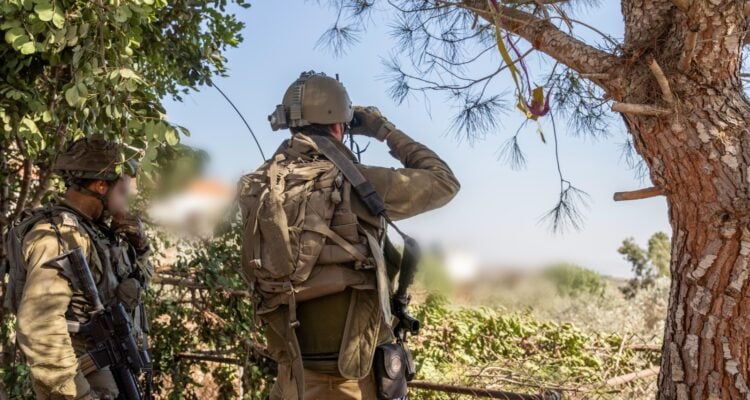Any blame for such death and destruction must be properly laid at the feet of those who store weapons in residences.
By Karen Bekker, The Algemeiner
A PBS Newshour report on October 22 about the fighting between Israel and Hezbollah incorrectly claimed that Israel’s “attacking medical workers and striking health care facilities are war crimes.”
But this is not an accurate statement of international law, nor would anyone with an understanding of how law works claim it to be so.
Both the Geneva Conventions and Customary International Humanitarian law provide that medical facilities lose their protected status when they are used for military purposes.
The International Committee of the Red Cross’s customary international humanitarian law database, Rule 28, states, “Medical units exclusively assigned to medical purposes must be respected and protected in all circumstances. They lose their protection if they are being used, outside their humanitarian function, to commit acts harmful to the enemy.” (Emphasis added.)
And Article 21 of the Geneva Conventions states, “The protection to which fixed establishments and mobile medical units of the Medical Service are entitled shall not cease unless they are used to commit, outside their humanitarian duties, acts harmful to the enemy. Protection may, however, cease only after a due warning has been given, naming, in all appropriate cases, a reasonable time limit and after such warning has remained unheeded.” (Emphasis added.)
Even a previous PBS report has acknowledged that, according to the International Committee of the Red Cross, “hospitals can lose their protections if combatants use them to hide fighters or store weapons.”
This has to be the case, otherwise it would incentivize warring parties to turn their hospitals into military bases, and provide a mechanism for those parties to attack others with impunity.
And, indeed, for these reasons, US forces or US-backed forces attacked hospitals in Iraq on at least four occasions.
Despite this, PBS’ Geoff Bennett introduced the segment by Leila Molana-Allen with the unqualified assertion that “Israeli airstrikes around Beirut have increasingly targeted health care facilities and health care workers,” and Molana-Allen failed to qualify her description of international law, creating a false impression of Israeli actions in Lebanon.
Further, within the report, Molana-Allen says, “and now, hospitals as well as homes are under attack. Yesterday Israel’s authorities said they believed a Hezbollah cash trove sat under Beirut’s El Sahel hospital, but said they wouldn’t strike it. Instead, they hit a different one. Just before midnight, an airstrike was launched on the entrance of Beirut’s Rafik Hariri hospital, flattening four buildings in front of it….” (Emphasis added.)
But as multiple news sources made clear, the hospital itself was not the target of the attack, and in fact, it wasn’t even hit — though it seems to have suffered collateral damage from the blast.
The BBC reported “the Israeli military said it hit a ‘Hezbollah terrorist target,’” and that the buildings that were hit were about 160 feet from the hospital. Even The New York Times reported that the strike was on “residential buildings across from,” the hospital.
But it appears as though Molana-Allen is trying to make it seem like the hospital itself was struck, when she says, “this is the capital’s main specialist public hospital, where children injured in the bombings are receiving surgery. Rescuers dug for hours through the mangled carcass of concrete and iron searching for survivors.”
One interview subject, a Lebanese medic, is quoted saying, “they [the IDF] don’t differentiate at all between military personnel, civilians, or paramedics. Anyone trying to do their duty is at risk.”
Yet, the speaker has no way to know what the military objectives of any particular strike are.
The segment also featured a video clip of what Molana-Allen claims is, “an 11-story apartment block leveled in less than a second. Dozens of homes and lives demolished.”
But, though she does note that residents were warned to flee, she makes no effort to explain why the building was a target.
In fact, the IDF press office has confirmed to CAMERA that the building was part of Hezbollah’s infrastructure.
The IDF has said for years that “Hezbollah militants and arms are systematically embedded in civilian areas and urban population centers.”
And on October 16, US State Department spokesperson Matthew Miller acknowledged, “We understand that Hezbollah does operate at times from underneath civilian homes, inside civilian homes. We’ve seen footage that has emerged over the course of the past two weeks of rockets and other military weapons held in civilian homes.”
Of course it is tragic when civilian homes or medical facilities are caught up in fighting, and even more so when civilians lose their lives, but Hezbollah, like Hamas, has embedded itself within the civilian population.
Any blame for such death and destruction must be properly laid at the feet of those who store weapons in residences, and who forced the opening of this front in the war with 11 months of rocket attacks on northern Israel that displaced tens of thousands of Israelis from their homes, including the July 27 attack that killed 12 Israeli Druze teenagers.
Neither the slain Israeli children nor the many displaced Israeli civilians were mentioned in this report.
At fault as well is UNIFIL, which failed in its mission to protect both Israeli and Lebanese civilians by restraining Hezbollah, yet which also isn’t even mentioned in Molana-Allen’s report.





